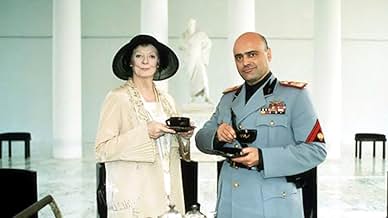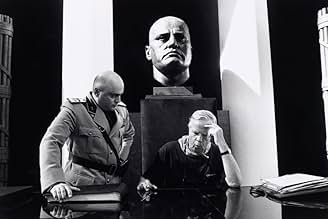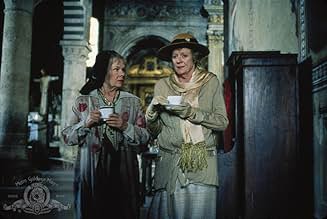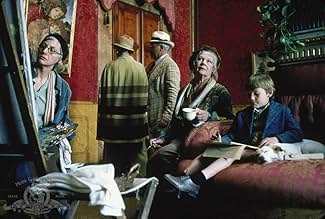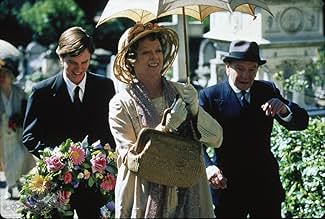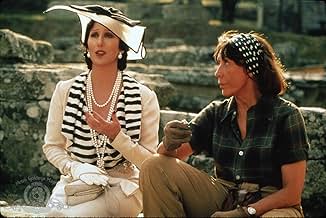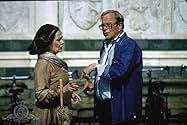AVALIAÇÃO DA IMDb
6,9/10
15 mil
SUA AVALIAÇÃO
Um menino italiano órfão é criado entre um círculo de mulheres britânicas e americanas que viveram na Itália de Mussolini antes e durante a Segunda Guerra Mundial.Um menino italiano órfão é criado entre um círculo de mulheres britânicas e americanas que viveram na Itália de Mussolini antes e durante a Segunda Guerra Mundial.Um menino italiano órfão é criado entre um círculo de mulheres britânicas e americanas que viveram na Itália de Mussolini antes e durante a Segunda Guerra Mundial.
- Direção
- Roteiristas
- Artistas
- Ganhou 1 prêmio BAFTA
- 5 vitórias e 3 indicações no total
Avaliações em destaque
Tuscany, 1935, a group of ladies walk along the streets of the city deservedly considered one of the world's art pearls, Florence. We don't know the ladies at first but, in time, we find them intelligent women who perfectly understand English but hardly understand orders. These are Scorpioni, elderly English women who will play a decisive role in the story as well as in the life of a young boy, Luca, strikingly similar to the director himself in his youthful years, Franco Zeffirelli...
Zeffirelli's autobiographical movie TEA WITH MUSSOLINI is a charming sentimental piece of work the action of which takes place in the Italy of the 1930s and 1940s: the hardest period not only in the lives of those many who were living then but for the entire 20th century history, when, as many readers will probably agree with me, humanity seemed to be conquered by infernal ideologies and bestial hatred. Yet, according to what Zeffirelli shows us in the movie, even in those darkest days, there was also room for beauty protection, care, art admiration and mutual help. As a Zeffirelli's fan, I consider TEA WITH MUSSOLINI one of the director's best films. But not because it only shows how bad war was. That is something most of us already know well. I love the film for other reasons. I like it because...
...there are moments when you will cry, when you will think and when you will genuinely laugh. A proper balance of emotions supplied by the director makes the movie a very decent entertainment filled with affection, sorrow, even nostalgia but also fun, charm and comfort. Who can possibly skip the scene of football match, for instance? I also laughed openly at the moment the ladies teach the soldiers saying "Good night". Isn't that a useful way to teach good manners and a foreign language at the same time? The moving moment in the orphanage will leave your eyes teary and the words of Ms Wallace about our contact with dead people may put you to nostalgia. But not for long. This fact of the film's "heart" goes in pairs with brilliant musical score Zeffirelli is famous for in his movies galore. What depth is there in this music and what supply of positive emotions!
...there are, except for variety of moments, beautiful Tuscan landscapes which make the movie a true postcard from Florence, San Gimignano and a true promotion of the Florentine art. This is also in accordance with the "soul" that Zeffirelli is so deeply attached to. The colorful hills around San Gimignano and the unique flowers under the Tuscany's sun leave hardly anyone indifferent. Consider, for instance, Luca's introduction of San Gimignano while he follows the bus with the ladies.
...there are foremost genuinely flawless performances that have to be linked to the deep development of characters. That is the aspect I'd like to pay more attention to in my comment. The ladies who occur to be at the focus are unforgettable. They supply the partly Italian movie with the truly English spirit. Maggie Smith does a wonderful job as Lady Hester: elegant, well mannered but also naive in her confidence in Mussolini and reluctant of Americans, the lady who drinks the spectacular but tragic tea with the duce. Judi Dench is memorable as Arabella who has drunk the wine of Florence, warmed her hands with the fire of Boticelli and Michelangelo and wants to share this inner experience with other people. Joan Plowright is, as usual, genuine and unforgettable. She fits to particular roles and although she has carried some other brilliant roles in latest Zeffirelli movies, Ms Mary Wallace seems to be the character for her. Joan portrays a warm hearted lady who is not only a good cook introducing Luca to bacon with eggs but also a great intellectual so much in love with Shakespeare. Cher representing the American side is also very appealing as Elsa - a luxurious woman with a flair for paintings, a Picasso connoisseur whose cup of tea is not only modern art but also good heart. She once helped Luca and the time will come for her to be helped in the spirit of Shakespeare "Love thyself less"... Through these different characters, Zeffirelli appears to present the wonder of diversity in human beings. The two seemingly contradictory characters, Elsa and Lady Hester, seem to be of totally opposite natures. Yet, even they turn out to have something in common... Finally a mention must be made of Baird Wallace who perfectly portrays Luca as a youngster and Charlie Lucas as Luca a little boy. Great young talents!
There is, finally, a great message of the film: that war cannot ruin the world, that the power of spirit is endless, that real art is born in the deep of one's heart. The final scene when Arabella says at the remained fresco of Santa Fina Funeral "Let Her sleep" seems to symbolize an eternal human quest for the sublime and the mysterious presence. If the "presence" is there, we shouldn't have anything to worry about. The horror of war is ceased and the historic sounds of San Gimignano bells ringing out joyfully together with the director's message proclaim the reconciliation and peace. The twin towers stand as silent witnesses...
Franco Zeffirelli, we should indeed appreciate art since it is the art that may bring out the genius of mankind.
Zeffirelli's autobiographical movie TEA WITH MUSSOLINI is a charming sentimental piece of work the action of which takes place in the Italy of the 1930s and 1940s: the hardest period not only in the lives of those many who were living then but for the entire 20th century history, when, as many readers will probably agree with me, humanity seemed to be conquered by infernal ideologies and bestial hatred. Yet, according to what Zeffirelli shows us in the movie, even in those darkest days, there was also room for beauty protection, care, art admiration and mutual help. As a Zeffirelli's fan, I consider TEA WITH MUSSOLINI one of the director's best films. But not because it only shows how bad war was. That is something most of us already know well. I love the film for other reasons. I like it because...
...there are moments when you will cry, when you will think and when you will genuinely laugh. A proper balance of emotions supplied by the director makes the movie a very decent entertainment filled with affection, sorrow, even nostalgia but also fun, charm and comfort. Who can possibly skip the scene of football match, for instance? I also laughed openly at the moment the ladies teach the soldiers saying "Good night". Isn't that a useful way to teach good manners and a foreign language at the same time? The moving moment in the orphanage will leave your eyes teary and the words of Ms Wallace about our contact with dead people may put you to nostalgia. But not for long. This fact of the film's "heart" goes in pairs with brilliant musical score Zeffirelli is famous for in his movies galore. What depth is there in this music and what supply of positive emotions!
...there are, except for variety of moments, beautiful Tuscan landscapes which make the movie a true postcard from Florence, San Gimignano and a true promotion of the Florentine art. This is also in accordance with the "soul" that Zeffirelli is so deeply attached to. The colorful hills around San Gimignano and the unique flowers under the Tuscany's sun leave hardly anyone indifferent. Consider, for instance, Luca's introduction of San Gimignano while he follows the bus with the ladies.
...there are foremost genuinely flawless performances that have to be linked to the deep development of characters. That is the aspect I'd like to pay more attention to in my comment. The ladies who occur to be at the focus are unforgettable. They supply the partly Italian movie with the truly English spirit. Maggie Smith does a wonderful job as Lady Hester: elegant, well mannered but also naive in her confidence in Mussolini and reluctant of Americans, the lady who drinks the spectacular but tragic tea with the duce. Judi Dench is memorable as Arabella who has drunk the wine of Florence, warmed her hands with the fire of Boticelli and Michelangelo and wants to share this inner experience with other people. Joan Plowright is, as usual, genuine and unforgettable. She fits to particular roles and although she has carried some other brilliant roles in latest Zeffirelli movies, Ms Mary Wallace seems to be the character for her. Joan portrays a warm hearted lady who is not only a good cook introducing Luca to bacon with eggs but also a great intellectual so much in love with Shakespeare. Cher representing the American side is also very appealing as Elsa - a luxurious woman with a flair for paintings, a Picasso connoisseur whose cup of tea is not only modern art but also good heart. She once helped Luca and the time will come for her to be helped in the spirit of Shakespeare "Love thyself less"... Through these different characters, Zeffirelli appears to present the wonder of diversity in human beings. The two seemingly contradictory characters, Elsa and Lady Hester, seem to be of totally opposite natures. Yet, even they turn out to have something in common... Finally a mention must be made of Baird Wallace who perfectly portrays Luca as a youngster and Charlie Lucas as Luca a little boy. Great young talents!
There is, finally, a great message of the film: that war cannot ruin the world, that the power of spirit is endless, that real art is born in the deep of one's heart. The final scene when Arabella says at the remained fresco of Santa Fina Funeral "Let Her sleep" seems to symbolize an eternal human quest for the sublime and the mysterious presence. If the "presence" is there, we shouldn't have anything to worry about. The horror of war is ceased and the historic sounds of San Gimignano bells ringing out joyfully together with the director's message proclaim the reconciliation and peace. The twin towers stand as silent witnesses...
Franco Zeffirelli, we should indeed appreciate art since it is the art that may bring out the genius of mankind.
This is a melodrama and you should not expect anything else. But what a melodrama! In the hands of a great director, using an eccentric story involving some eccentric people, it conveys straight to the heart how the great darkness descended upon Europe in the 1930's. It tells you that the greatest evil is the work of humans, and that the potential for evil lurks in the human soul. But, and here is the movie greatest strength, it shows you that humans possess the capacity to be human and to act human, when they heed Shakespeare's advice: "Love thyself last". All the negative comments that can be made about this or that deficiency caused me to downgrade this movie's rating from a "10" to a mere "9". Go see it. If you have kids - make sure to take them along for a great and satisfying lesson about life as it should be lived.
This film is one of the most touching and lovely films that I have seen in many years. Its gaggle of actresses are second to none and turn out excellant performance, Joan Plowright in particular brings an irresistable sweetness to the role. People who have commented on the film so far seem to have neglected to mention the soundtrack which is beautiful and inspiring with a wonderful piano piece. Criticism that the film is too old fashioned or that the characters are unappealing and pompous seems to miss the point, the very charm of Hester (Maggie Smith in particular)is how she overcomes her snobbery at the end and realises how much Elsa (Cher, who in any other film would doubtless be misplaced but in this case fits the role like a glove) has done for the Scorpioni. In short the film is a relic of a gentler age and is simultaniously uplifting, upsetting and relaxing. I implore everyone to hunt down the soundtrack on CD to the ends of the earth if necissary.
I had wanted to see this film for some time and when the opportunity finally materialised I was enthralled. It is probably the best performance I have seen by Maggie Smith, who often seems to be playing the same character actually. But this is her best since Miss Jean Brodie, and Joan Plowright, Judi Dench, Lily Tomlin and Cher are all equally impressive.
The settings are skilfully designed to draw the viewer in, and when you are setting your movie in Florence and its environs you can't go wrong anyway. The ongoing clash between two worlds i.e. Lady Hester Random (Maggie Smith) versus Elsa (Cher) reaches a satisfying resolution which it would be unfair to reveal.
There are splendid comic vignettes mixed into the overall drama. Judi Dench and her dog being thrown out of the cathedral, sharply contrasts with the chilling moment when the Jewish arts professor is taken away by the Gestapo. Understated but none the less effective, probably more so, because of it.
If you haven't seen this film, see it as soon as you can.
The settings are skilfully designed to draw the viewer in, and when you are setting your movie in Florence and its environs you can't go wrong anyway. The ongoing clash between two worlds i.e. Lady Hester Random (Maggie Smith) versus Elsa (Cher) reaches a satisfying resolution which it would be unfair to reveal.
There are splendid comic vignettes mixed into the overall drama. Judi Dench and her dog being thrown out of the cathedral, sharply contrasts with the chilling moment when the Jewish arts professor is taken away by the Gestapo. Understated but none the less effective, probably more so, because of it.
If you haven't seen this film, see it as soon as you can.
This film could have been titled 'four crazy grannies' for the marvelous portrayal of little old ladies, each more eccentric than the next. Like the comedy team of Matthau and Lemon, Dench, Smith and Plowright have a chemistry that is explosive.
Maggie Smith played a role that she has spent a lifetime perfecting. She captivates us as a snobbish dowager, tantalizes us with her improbable tea party and brings us to tears when she demonstrates her capacity to grow.
Although she may not have wowed us with her Shakespeare, Joan Plowright's compassion for her sudden charge made me wish (that at age 32) she would adopt me. Her love of the classics, remind us that art, literature and friends can help us transcend life's constant miseries.
Cher demonstrated that she could act in any time period. While Dame Judi Dench (not allowing herself to be typecast as a Queen) portrays a particularly pitiful creature as an aging artist with more passion than talent.
This film sends a clear message to Hollywood: experience and talent win out over T&A.
Applause at the end of this movie is to be expected.
Brava!
Maggie Smith played a role that she has spent a lifetime perfecting. She captivates us as a snobbish dowager, tantalizes us with her improbable tea party and brings us to tears when she demonstrates her capacity to grow.
Although she may not have wowed us with her Shakespeare, Joan Plowright's compassion for her sudden charge made me wish (that at age 32) she would adopt me. Her love of the classics, remind us that art, literature and friends can help us transcend life's constant miseries.
Cher demonstrated that she could act in any time period. While Dame Judi Dench (not allowing herself to be typecast as a Queen) portrays a particularly pitiful creature as an aging artist with more passion than talent.
This film sends a clear message to Hollywood: experience and talent win out over T&A.
Applause at the end of this movie is to be expected.
Brava!
Você sabia?
- CuriosidadesCher has stated that the only reason she took the part of Elsa was because Writer and Director Franco Zeffirelli said he could only see her and no other actress in the role.
- Erros de gravaçãoThe tanks the Germans ride in are, in fact, U.S. Army M4 Shermans, not German-built Panzers.
- Citações
Lady Hester: The Germans and the Italians couldn't get rid of us. There is absolutely no reason why we should surrender to the Scots.
- Versões alternativasThe MGM DVD, ISBN 0-7928-4300-2, is missing least one shot: The original tea with Mussolini scene ends with Mussolini forcing himself upon the reporter, forcing her onto his desk (i.e., he rapes her.) This DVD omits that ending and leaves the reporter's change in behavior unexplained.
- Trilhas sonorasMattinata Fiorentina
Written by Giovanni D'Anzi (as D'Anzi) and Michele Galdieri (as Galdieri)
Performed by Alberto Rabagliati
Principais escolhas
Faça login para avaliar e ver a lista de recomendações personalizadas
- How long is Tea with Mussolini?Fornecido pela Alexa
Detalhes
- Data de lançamento
- Países de origem
- Central de atendimento oficial
- Idiomas
- Também conhecido como
- Tea with Mussolini
- Locações de filme
- Empresas de produção
- Consulte mais créditos da empresa na IMDbPro
Bilheteria
- Orçamento
- US$ 12.000.000 (estimativa)
- Faturamento bruto nos EUA e Canadá
- US$ 14.401.563
- Fim de semana de estreia nos EUA e Canadá
- US$ 1.633.183
- 16 de mai. de 1999
- Faturamento bruto mundial
- US$ 14.401.563
- Tempo de duração1 hora 57 minutos
- Cor
- Mixagem de som
- Proporção
- 1.85 : 1
Contribua para esta página
Sugerir uma alteração ou adicionar conteúdo ausente

Principal brecha
By what name was Chá com Mussolini (1999) officially released in India in English?
Responda

